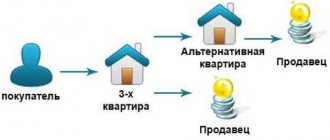The status of a privatized apartment means that it is privately owned. Moreover, the number of owners is not limited, and it can be either one person or several individuals owning shares in the apartment. The right of ownership is revealed through the possibilities of owning, using and disposing of a thing. In this case, the possibility of exchanging an apartment is a clear example of property disposal. A privatized (private) apartment can be exchanged for a similar private apartment. Until 2005, it was possible to exchange a privatized apartment for a non-privatized one, that is, a municipal one, the owner of which is not a specific individual, but an administrative entity. However, at present, such a procedure is legally impossible, and exchange is allowed only between non-privatized apartments.
By the way, exchange is possible only when it comes to non-privatized apartments. If the apartments are private, then the correct term will be exchange. Let's consider how to formalize the exchange, what to do if one of the owners of privatized housing opposes the transaction.
Is there an exchange of apartments currently
In the Housing Law , the question is whether there is now an exchange of apartments according to the law? If yes, what kind of housing can be changed? Or just buying and selling? given by the author Dragon, the best answer is 1. Residents of Moscow can change non-privatized housing by contacting the State Unitary Enterprise Moszhilservice.
There should be something like this in your city. Without any realtors. 2. Non-privatized to privatized - through privatization. 3. Why spend extra money on realtors? Through purchase and sale, of course, it is also possible, but we don’t know your situation. . Of course it exists! civil law transaction: exchange. In this case, you can change both owned and municipal apartments - there you only change rental rights - one to another. Or you can change private - to non-private - then the ownership rights change to rental rights. It’s more difficult to do - simply because realtors are too lazy to bother. But it’s safer - in any case, you’re left not with cut green paper that you ate from a mouse cell (there was such a fact in one bank - there was a plywood back wall near the cells :))) - but with another housing. Finding an option is definitely more difficult. But if in your area, you will find a smaller one for a larger one, or vice versa. and you can do without realtors.
Possibilities for distributing property between privatization participants: allocation of shares in kind
According to the law, the rights of the remaining owners of this housing should not be violated, and if they wish to live separately, they should have such an opportunity. It can be implemented through the allocation of shares in common property in kind, that is, in kind. Since the apartment, which is in joint ownership, has 3 rooms, and the number of owners is equal to 3, each of them can be allocated a natural share of 1 room. At the same time, the actual distribution of property between them - which of the family members will become the owner of a particular room - must be established between them as a result of a jointly reached agreement. If such an agreement cannot be reached, the owners can jointly go to court, which will allocate the shares in kind. One of the owners who is interested in identifying the property belonging to him for the purpose of disposing of it can apply to the court with a corresponding application. In particular, parents who want to divide their property for the purpose of separation can file a statement of claim. The achieved distribution of property between the owners must be documented: if a certain division mechanism is the result of an agreement, it is advisable to formalize it in writing.
In practice, such a mechanism is most often applied to multi-room apartments, in which the shares allocated in kind primarily represent individual rooms in the corresponding facility. If we are talking about a one-room apartment of a small area, in which the allocation of shares in kind is difficult, the division between the owners can be made in proportion to the value of each share. In this case, the disposal of shares may turn out to be somewhat more complicated than in the case of shares determined in kind: the most acceptable mechanism here would be the sale by the owner of his share in this real estate to other owners.
Is there currently an exchange of apartments from one city to another?
If a person lives in an apartment under a social tenancy agreement, then virtually the only way to change the conditions and place of residence is to exchange the apartment. The peculiarity of such a transaction is that it is regulated by the Housing Code. To carry out the exchange of municipal housing, you must also have a whole package of documents, starting with the consent of the landlord, and ending with the notarized consent of all registered citizens who have reached the age of majority.
There is not enough money, and there is no place to live. An alternative transaction eliminates this risk. There is another method, tested by realtors in the capital and used quite often when apartments are exchanged in Moscow. Trade-in This method is called Trade-in, in which the client exchanging housing quickly moves to a new building, and his old apartment is accepted as payment.
Are there any peculiarities in a transaction between relatives?
Article 567 of the Civil Code regulates issues related to the exchange of housing . At the same time, the subject composition of its participants is not specified there. The exchange of apartments acts as a two-way transaction, therefore, regardless of whether you are relatives or not, the contractual terms will be absolutely the same if you make a related exchange, including privatized housing.
If related exchange is required by municipal housing, then the transaction will be regulated by Art. 71-75 Housing Code of the Russian Federation. The consent of all registered family members and guardianship authorities for minors will be required.
Is there currently an exchange of apartments from one city to another?
- the right to use the residential premises to be exchanged is disputed in court;
- a decision has been made to overhaul a certain house where the living space to be exchanged is located, with reconstruction or redevelopment of residential premises;
- a decision was made to demolish the house where the living space is located, subject to exchange or its conversion for use for other purposes;
- as a result of the exchange, a citizen who has one of the severe forms of chronic diseases specified in clause 4 of part 2 of article 51 of the Housing Code of the Russian Federation moves into a communal apartment.
- In accordance with the text of Part 5 of Article 74 of the Criminal Code of the Russian Federation, the exchange of social rental housing involves the cancellation of previous rental agreements concluded earlier and the conclusion by lenders of new agreements on the rental of residential premises with tenants under an exchange agreement.
Thus, registration of registration before the sale of the apartment is convenient for both parties: the buyer can be calm that only he is registered in the apartment, and the seller - that they will not demand extra money from him. As specialists of the MIC Group note, it is very difficult to independently make a long-distance exchange, Therefore, it is best to contact a real estate agency. “The main thing is to approach the search for an intermediary responsibly, so that he has both experience and a good reputation in the market,” sums up Inna Ignatkina. – In addition, I would like to advise participants in intercity transactions to still find time to come to another city in person for key stages of the process.
We recommend reading: Children under 18 years old
What documents are needed when completing a transaction?
Each employer must provide not only the contract itself. You will need a whole package with additional documents, including:
- Consent of family members involved in the exchange. Written form is required.
- A certificate stating who lives with the tenant and who has a residence permit in the apartment.
- An extract that gives permission to move in.
- Social tenancy agreement associated with the previous apartment.
- An order giving the right to move into new housing.
- Passport, in the form of a photocopy.
- A statement asking regulatory authorities to approve the procedure itself.
A sample of a related exchange agreement can be downloaded from this link.
How to exchange privatized housing?
In this case, the agreement is concluded between persons whose residential premises are the property of one of the parties to the agreement. To exchange privatized housing, registration with Rosreestr is required.
Then they undergo re-registration by contacting representatives of the cadastral chamber. After which the parties to the agreement are issued new BTI technical passports.
Such an exchange is considered one of the safest types of transactions. But you will have to invest a considerable amount of money in it.
For the sale or donation of residential real estate, the following documents will be required if the choice is made in favor of such a procedure:
- Technical passport for housing.
- Confirmation of housing registration by cadastral authorities.
- Consent in writing from the guardianship authorities. This is relevant for persons who have lost their legal capacity or have not reached the age of majority.
- Sales Agreement. If there are other co-owners.
- Passports of piece workers, and a document confirming the presence of family ties.
How many times can you receive maternity capital? Find the answer to the question in the material at the link.
Sample agreement for the exchange of apartments.
If one of the apartments is privatized and the other is not
This process is characterized by the fact that it takes a lot of time. Since Russian legislation does not contain an exact description of the rules for such transactions.
If one of the apartments is registered under a social tenancy agreement, it is better to privatize it before the transaction is completed. And only after that carry out the exchange in the same order as described above.
There is another solution. We register a minor in a non-privatized apartment, deregistering him in an apartment that has been privatized.
For information on how to apply for temporary registration and how much it costs, see this publication.
After this, the new tenant enters into a social rental agreement with the state. The next step is the exchange of living space using a gift agreement.
Direct real estate exchange and how to do it? Is there an exchange of apartments currently
The first of them is based on the fact that potential buyers have a shortage of cash. Today, people have become less attracted by the prospect of using a mortgage loan, since the risks of losing income and paying the monthly payment on time have increased significantly. In addition, last year's results showed that the number of transactions on the secondary market decreased by 30%. There was also a decrease of 18% in the volume of contracts with an equity participation clause.
This is the name for a multi-stage transaction in which from three to ten or more parties can participate. Only a real estate market specialist can build a scheme for such an exchange. In Soviet times, underground brokers arranged exchanges from dozens of apartments. Nowadays, only “seasoned” realtors with a large baggage of completed transactions can work through purchase and sale or by direct exchange, building chains of clients. Is it possible to exchange an apartment without an agency? It is possible, but to do this, you may have to quit your job and devote yourself completely to this task.
Related apartment exchange
The next method is a little more complicated. It is necessary to register an adult family member in a non-privatized apartment, and before that, deregister in privatized housing. If the size of the living space meets the standards of social rent, then registration will take place without any problems. Then, using an official document confirming the donation, replace the owner of a private apartment.
- One of the exchanged premises is unsuitable for further residence.
- The right to use housing is negotiated in court.
- The building in which the apartment planned for exchange is located may be demolished in the near future.
- A person infected with chronic diseases may move into the apartment that is offered for exchange, and living with him may be hazardous to health.
- Possible major renovation of the house.
About methods of related exchange
The first and simplest option is to draw up a simple exchange agreement. In this case, the parties simply exchange residential premises that they own. And each of the parties simultaneously performs the functions of acquirer, alienator, and seller.
It is decided by individual agreement whether such a transaction will be of equal value or not. The contract can include any conditions regarding additional payment, both for one and for the other party.
Instant registration with Rosreestr along with certification by a notary is acceptable. The agreement is subject to taxes at 13 percent.
There is another way to carry out an exchange with close relatives - drawing up an agreement for the purchase or sale of apartments. This method is used by those who are interested in saving as much money as possible. Or those who simply don't trust the exchange.
The agreement is drawn up in two copies. And for each of them, notarization is required. At the final stages, the deal is finalized by contacting Rosreestr.
You can make a donation, but this method is the most expensive. After all, this procedure is subject to serious taxes if close relatives do not participate in it.
What to do if the hot water is turned off without warning? Step-by-step instructions are in this article.
Articles regulating the exchange procedure.
Is it possible to exchange an apartment without selling it in 2020?
Today we will talk about the specifics of filing a deduction under an exchange agreement, and also provide answers to common questions on the topic. Tax obligations when exchanging housing Under the provisions of the Tax Code, the party who exchanged real estate on the basis of an exchange agreement is required to pay personal income tax only if the exchange was made with an additional payment.
However, the fact that the housing belongs to the city does not mean that those living in this apartment cannot claim improved living conditions, and the only way to expand the living space (or change the area) is the same exchange. However, such transactions have not become widespread due to the need to collect numerous papers, as well as the unprofitability of the exchange for the owner of privatized housing.
Conditions for the exchange of non-privatized apartments
Exchange of non-privatized housing is the only legal way to change conditions without large capital investments. Other methods of alienation are possible only after privatization has been carried out.
When searching for a suitable option, you must comply with the following requirements:
- exchange can be carried out between real estate located in different cities, but within the Russian Federation;
- you can only exchange for an apartment, which is also rented out on social rental terms;
- It must be taken into account that the area per family member must be at least 12.5 meters.
How to exchange a non-privatized apartment for an equivalent one?
If a worthy option for exchange appears, it is necessary to carry out a series of actions, which includes obtaining the necessary permits for the transaction, as well as agreeing on the procedure with relatives.
To comply with the legality of the exchange process, you need to go through the following steps:
We recommend that you read:
Risks when buying an apartment
- Obtaining consent to the transaction from family members who live in this living space. Permission must be obtained not only from persons who currently live in the apartment, but also from those who are temporarily absent, for example, due to conscription into the army. Permission is not required from relatives who are not registered in the premises or from subjects who are not family members.
- Agreement with family members is certified by a notary. The other party to the transaction must carry out the same actions. Refusal to exchange one of the relatives may be grounds for going to court.
- Difficulties may arise if one of the people living in a non-privatized apartment is a minor. All transactions in this situation must be agreed upon with the trustee or guardianship authorities. They give their response within two weeks from the receipt of the relevant application. Otherwise, there is a risk that the transaction will be declared illegal.
- The user of the housing with whom the social tenancy agreement was drawn up is submitted an application requesting the exchange of the apartment. Each party is obliged to contact their landlord. The application is accompanied by a copy of the passport, technical documents for the property, a social tenancy agreement, cadastral extracts, an act on the sanitary and hygienic condition of housing, data from house books, and notarized approvals of the transaction by family members.
- If the outcome is positive and a permitting decision is received from the landlord, it is necessary to collect a package of documents to conclude an exchange agreement.
- An agreement is drawn up, signed by the parties and sent to the authority for approval. He puts his visas on it, then you can begin the actual exchange of real estate.
- A new social rental agreement is concluded between each party and the new landlord. To do this, the authorities are obliged to terminate the old contract in a timely manner and, within ten days from the receipt of the application, formalize the rental relationship with the new tenant.
The exchange of non-privatized real estate is a rather complex process that requires the parties to obtain additional permits and approvals. If it is impossible to privatize an apartment, this is practically the only sure option to improve your living conditions.
The government authority does not always give permission to carry out this type of transaction. Refusal is possible in the following cases:
- if a claim is brought against one of the parties to the proposed transaction to terminate or amend the social tenancy agreement;
- there is no agreement on the upcoming exchange of at least one of the family members;
- a minor lives in the apartment, and there was no permission for the transaction from the board of trustees;
- unequal exchange, in which the rights of one of the parties are significantly infringed;
- the apartment being exchanged is declared uninhabitable;
- the right to use the apartment is subject to challenge through legal proceedings;
- there is a decision of the administrative authorities on the upcoming major renovation of the building with the exchanged living space or the redevelopment of the premises is expected;
- there is a municipal decision to demolish the house;
- As a result of the exchange, a citizen moves into communal housing, with whom cohabitation is impossible due to his chronic illness.
If approval of a transaction is refused, there are two options. One of them is challenging the landlord’s decision, the second is searching for another non-privatized apartment.
Features of completing and processing an apartment exchange transaction
In the Tax Code of our country there are no instructions regarding the payment of tax when exchanging apartments, but the Civil Code of the Russian Federation (Article 567) clearly states that taxation under an exchange agreement is identical to a purchase and sale agreement. And this transaction is already reflected in the Tax Code of the Russian Federation, each party acts as both a seller and a buyer. The owner of an apartment is exempt from paying tax if it has been in his ownership for more than 3 years.
- The first step is to start with a housing assessment to understand whether there will be a need for additional payment or not.
- Preparing the apartment (legally), that is, paying off all outstanding payments and removing encumbrances from the apartment (if any).
- Preparation of a technical passport for housing (if it does not exist, order it from the BTI).
- When the desired option is selected, the procedure for concluding an exchange agreement occurs.
- Next, the transfer of housing is carried out according to a special act.
- Then you need to submit documents for state registration to Rosreestr and receive an extract there.
- Registration of a new technical passport.
- All that remains is to submit information to the tax office and re-register settlement and cash accounts.
We recommend reading: Agreement for assignment of the right to use a garage
How does an apartment trade-in work?
The existing offset scheme allows you to exchange old housing for new housing in a new building without much hassle. To use this method of purchasing an apartment, you need to book the apartment you like and document its cost. As a rule, to complete an exchange it is necessary to conclude several agreements, one of which provides the right to sell by the contractor (the developer or the party representing him) the owner’s real estate. You may need to make an advance payment. The second agreement is an agreement that the developer provides the client with new housing in exchange for funds received from the sale of the old apartment and a possible additional payment.
Of course, clients can try to sell their old apartment on their own and buy a new one, using a mortgage in case of a lack of financial resources. However, selling a secondary property and completing paperwork requires some time, because quickly finding a buyer on your own is quite problematic, and there is a risk of running into scammers. Precisely because, in order to avoid this, the developer acts as the buyer in this case. True, in this case you can get a slightly smaller amount for the old living space. But if you act through a real estate agency that is a partner of the developer (ours is one of them), you can, on the contrary, count on buying out the apartment at the real market price.
The advantages of this option of purchasing an apartment in a new modern building include the possibility of purchasing exclusively with funds received through the developer’s purchase of a secondary apartment. But if you purchase housing in a house that is still under construction, it is worth having a backup housing option while completion and finishing are in progress. It is also worth remembering that registration at the place of residence in a new building is not immediately possible.
Are there any options for exchanging apartments now?
Currently, exchange transactions are carried out extremely rarely; you can wait a very long time for a suitable option. Work faster through buying and selling. Nothing prevents you from working on exchange and purchase and sale at the same time. If you provide more information, it will be possible to evaluate your apartment, calculate the amount of additional payment and offer you approximate apartment options (you can contact me in a personal message).
Sergey, there are several methods to solve your issue. One of them is mena. But this is only one of them. Therefore, an experienced realtor uses all acceptable methods to solve a specific case. In your situation, in order to choose a way to solve the problem, you need to know the answers to many questions concerning you and your apartment.
What to choose - an exchange or sale agreement?
Exchange and sale are similar:
- Tax 13%. If ownership of real estate is more than 5 years, then this tax is not charged.
- The property must be registered and pay a state fee for this.
- An agreement of the spouses certified by a notary is required.
- Respect for the rights of young children.
- The property has no encumbrances.
- The parties have the right to use the services of representatives.
Differences:
- Sale under a social lease agreement is unacceptable, but exchange is possible.
- According to fate, the purchase and sale agreement goes through faster.
- If the exchange agreement is terminated, the citizen receives his property back, but when concluding a purchase and sale agreement, it is problematic to get the money back.
- An exchange involves settlement in real estate, a purchase and sale agreement – in money.
Which option to choose depends on the situation.
Apartment exchange
The direct exchange procedure is quite troublesome. Its essence lies in the fact that the apartment of one participant in the transaction is exchanged for the property of the second participant, and an exchange agreement is drawn up between the parties, which replaces two separate purchase and sale agreements.
- obtain permission from the landlord;
- collect the necessary documents:
- a statement signed by all adult family members of the employer;
- original social lease agreement;
- certificate on the number of persons living in the apartment;
- a certificate confirming the absence of debt for utility services;
- written consent to exchange housing from the guardianship and trusteeship authorities (if minor children or incapacitated persons live in the apartment);
- receipt of payment of state duty;
- enter into a real estate exchange agreement with another tenant.
Exchange with surcharge
An important condition of the exchange agreement is the equivalence of the objects.
Often it is impossible to achieve actual equivalence, so an exchange agreement implies an additional payment for one of the parties. The exchange of an apartment with an additional payment can be carried out through an alternative transaction and a purchase and sale agreement can be concluded. In this case, the exchange of an apartment with an additional payment occurs according to the following scheme:
- Concluding a purchase and sale agreement: simultaneous sale and simultaneous purchase of an apartment that you have chosen in advance as an apartment for exchange.
- Simultaneous registration of contracts for transfer of ownership.
Such transactions are no different from concluding a regular residential purchase and sale agreement. The recipient of the surcharge will also have to pay personal income tax, and the person who pays the surcharge has the right to receive a tax deduction next year, but only if they have owned the property for more than 3 years.
How apartments are exchanged between cities
ATTENTION . It’s clear that you won’t have time to travel around another city and offer to exchange your apartment for another. The widespread use of the Internet in everyday life offers many search options, for example, the Avito website, which is equipped with a special search engine that can accurately determine your needs and wishes and provide the most suitable options.
If you do not want to resort to the help of a realtor, then you must soberly realize that you will still have to evaluate the apartment you are going to exchange for. Here an independent expert will come to the rescue, who will be able to determine the cost of housing, taking into account the characteristics and indicators of the area.
Exchange of apartment for apartment between cities
For many, the possibility of exchanging real estate between cities will be a real discovery, although the practice of exchanging living space has existed since Soviet times. In addition, the exchange will minimize the headache of selling real estate and buying a new one.
Also quite often there are transactions to exchange one apartment for another with an additional payment. This option is suitable for those who want to improve their living conditions. An example is a situation where a divorce process occurs, the spouses exchange their shared living space for several smaller apartments and move away. Then one of the spouses moves to another city, and here the opportunity opens up to exchange for improved living space, paying an additional amount.
Necessary documents for exchanging a private house for an apartment
The procedure for registering the transfer of ownership of a residential building and apartment in accordance with the exchange agreement is carried out simultaneously at the registration authority, which has jurisdiction over the location of the residential premises. It is better to immediately carry out this process under the supervision of a lawyer, who will be able to check the presence or absence of all receipts, contracts and certificates, and will also tell you how to formalize them correctly, so as not to delay the exchange transaction.
The lawyer must also make sure that none of the properties are foreclosed on or have an outstanding mortgage. Checking the legal cleanliness of an apartment or house is a very important step that should not be overlooked.
Next, all the necessary documents are submitted to register the ownership of the new owner. The main thing is to obtain a Certificate of Ownership of the new apartment, which both parties to the transaction must receive on the same day.
How to exchange an apartment
- Exchange is a transaction in which one apartment is transferred into ownership as a replacement for another.
- Exchange through purchase and sale - the acquisition of new housing and the simultaneous sale of existing property.
- Trade-in is the process of changing secondary real estate to a new building.
The Fedorov couple decided to divorce, while they own a three-room apartment as common shared ownership. The husband wanted to buy out part of his wife’s property, and she, in turn, suggested that her husband exchange their apartment for two one-room apartments. Having agreed on this option, the parties exchanged housing. Afterwards, without mutual claims to each other, the divorce process was carried out.









